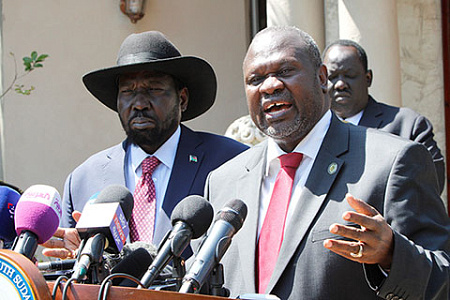
A new large-scale military conflict may break out in East Africa. Events in the youngest country on the planet, South Sudan, which was founded in 2011 and is rich in oil reserves, but nevertheless monstrously poor, risk becoming its catalyst. It was not only the threat of civil war that hung over him. Neighboring Sudan, which once with great difficulty recognized the independence of this territory, may join the conflict between two local high-ranking officials.
A conflict broke out between President of South Sudan Salva Kiir and First Vice President Riek Machar. An arrest warrant was issued for the second, representatives of the Ministry of Defense broke into his house and issued an order. However, Mashar was not detained. These events threaten to resume the civil war that has recently ended here. Its main characters were Kiir and Machar. It is more correct to call that civil war an ethnic conflict. Kiir is from the Nuer people, and Mashar is a Dinka. The bloody war between the two nations lasted for more than six years. The clashes finally subsided only by 2020, claiming the lives of 400,000 people, not counting those who died from indirect causes, of which there were many. In 2017, the UN declared famine in Unity State, a catastrophic situation even by African standards. A year later, Kiir and Machar signed a peace agreement. It was concluded in the Sudanese capital Khartoum and provided for the division of positions between the Dinka and Nuer, including in the ruling Sudanese National Liberation Movement party. The partition, however, did not work out. Machar formed the Sudanese National Liberation Movement in Opposition party and accused Kiir of authoritarian methods. Five years later, it finally became clear that the fragile interethnic balance of power had been disrupted and the story of hundreds of thousands of deaths threatened to repeat itself.
“We strongly condemn the unconstitutional actions of the Minister of Defense and the head of the National Security Service, who, along with more than 20 heavily armed vehicles, forcibly entered the residence of the First Vice President. His bodyguards were disarmed and an arrest warrant was issued for him on unclear charges. Attempts are being made to move him,” one of the functionaries of the Sudanese National Liberation Movement in Opposition, Reat Muosh Tang, conveyed this message to French journalists. He did not say that Machar’s supporters would take up arms, but it is quite possible. The vice president does not have full control over the forces that support him. The threat of civil war was announced by the head of the UN mission in South Sudan, Nicholas Hayes.
Many observers are particularly concerned about the current situation due to the possible prospect of outside interference in the conflict. South Sudan is a state formed as a result of the war that lasted from 1985 to 2003, which claimed more than 2 million lives. Its consequence was the disintegration of the united state of Sudan into two parts: the north inhabited by Muslim Arabs (this state is now called Sudan) and the south, where representatives of the black race, professing Christianity and traditional beliefs, predominate. Khartoum recognized the independence of the Southerners. At the same time, no one really hid that the confession was forced. Torn apart by its own civil war, Sudan could not afford to continue fighting for an important, mineral-rich, but rebellious region that had resisted Arabization and Islamization for centuries.
Now, it seems, relative order may be restored in Sudan for once. According to government sources, the fighting is coming to an end. The fact is that the army managed to achieve important strategic successes and finally recapture the capital from the rebel special forces, with whom there had been a confrontation for many years.
In retaliation, the commandos organized a large-scale drone attack, which killed three journalists, among others. The rebel press service said 89 people were killed in the strikes and “a lot” of military equipment was destroyed. They also said that the battle for Khartoum is not over yet.
According to some Western media, the commandos are really not going to lose their grip. It is reported that the province of Darfur is in their hands. There they continue to strengthen and even take new cities. In fact, the situation of splitting the country into two parts is becoming fixed. The situation in Darfur is similar to that in the south. There is a conflict between the Negroid peoples and the Arabs. Therefore, there is also ground for demands for independence. If Darfur secedes, it will turn out that, having ceased to be a British-Egyptian possession in 1956, the state of Sudan will be divided into three parts.
